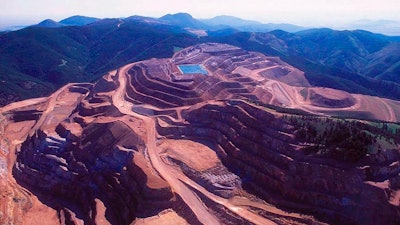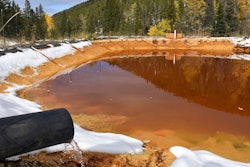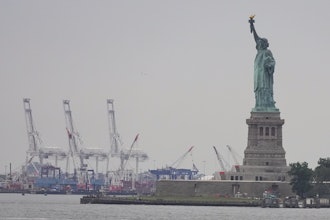
BILLINGS, Mont. (AP) — An Idaho mining company went to court Thursday seeking to overturn its designation by Montana officials as an industry "bad actor" because of pollution tied to its CEO.
Hecla Mining Co. asked a judge to block the Montana Department of Environmental Quality from suspending permits for two new silver and copper mines the company has proposed beneath the Cabinet Mountains Wilderness, a remote, 147-square mile (380-square kilometer) expanse of glaciated peaks near the Idaho border.
Judge Matthew Cuffe did not immediately rule following the hearing in Montana District Court in the small town of Libby near the wilderness area.
Coeur d'Alene-based Hecla and its president and CEO, Phillips S. Baker, Jr., were issued violations letters last month because of ongoing pollution at mines operated by Baker's former employer.
Baker was chief financial officer at Pegasus Mining, which declared bankruptcy in 1998 with insufficient bonds to cover its cleanup obligations. That saddled the state with more than $35 million in pollution cleanup costs, including at the Zortman-Landusky mine near the Fort Belknap Indian Reservation, according to state officials.
Baker, who also serves as chairman of the National Mining Association, told The Associated Press in a recent interview that he was never in control of Pegasus, where he worked four years. He said there's no link between Pegasus and Hecla — and argued the bad actor designation appears to be an attempt to stop the two new mines that would employ about 300 people each.
"There's no substance to this claim being made under the bad actor provision," Baker said. "As the financial officer I don't direct or control the mining activities. I'm not involved in negotiations of what the permit should be."
Montana's bad actor law blocks individuals and companies who don't clean or pay for the cleanup of old mines from starting new ones.
Pegasus mines polluted surrounding waterways with cyanide, arsenic and other contaminants, prompting water treatment measures that may be needed permanently.
Bozeman attorney Jim Goetz is representing the state environmental agency. He said Hecla knowingly employed Baker despite his bad track record in Montana.
"If you have someone that's been in a position of control in one company that leaves Montana holding the bag for reclamation costs, that person ought not be able to just shift companies and come back into the state without repairing the problem," Goetz said.
Goetz asked Cuffe to transfer the case to state court in Lewis and Clark County, where the Department of Environmental Quality is located.
State officials have said Hecla could have to reimburse more than $35 million in Pegasus-related cleanup costs if it wants to pursue copper and silver in the Cabinet Mountains, at the Montanore Mine near Libby and Rock Creek Mine near Noxon.
If the company doesn't want to pay or otherwise resolve the alleged violations, Hecla could have its mining permits and licenses suspended, Livers wrote in a March 20 letter to the company.
Hecla's new mines have received strong support from leading Republicans including U.S. Department of Interior Secretary Ryan Zinke, a former Montana congressman. Zinke has been sympathetic to mining industry complaints about bureaucratic delays, and now leads an agency responsible for assessing the two mines' environmental impacts.
They are proposed in an area rich with wildlife including grizzly bears and wolverines that's prized by hikers, anglers and hunters. Sporadic mining has occurred in the area since the early 1800s, according to the U.S. Forest Service.
But there are worries the large-scale projects proposed by Hecla could drain groundwater supplies, damaging the habitat of federally-protected bull trout.
Environmental groups last year urged Montana regulators to impose the bad actor designation, and now are seeking to intervene in the case.






















